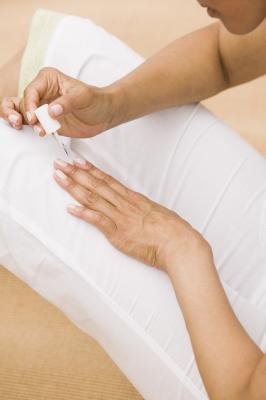Brittle, splitting peeling nails aren’t just unattractive. They can be painful if they split down to the live nail bed, making it difficult for you to perform daily activities. Although thin, brittle nails can happen to anyone, women suffer from this problem more often, as do both genders as they get older, says the American Academy of Dermatology (AAD). The most common causes of peeling nails are quite ordinary — repeated wetting and drying.
More About Nails
Nails that peel, break and chip can be caused by internal factors, such as nail psoriasis, fungus, thyroid disorders, anemia and chemotherapy drugs. Even heredity can play a role, says dermatologist Phoebe Rich of the Oregon Health and Science University in Portland. However, getting your nails wet repeatedly and then drying them is generally the cause of peeling nails. The medical term for this condition onychoschizia. According to the American Osteopathic College of Dermatology (AOCD), onychoschizia is more troublesome in the wintertime and in places with low humidity.
Prevent
The household tasks you perform each day — washing dishes, mopping and scrubbing the sink — contribute to brittle, peeling nails. Exposure to the harsh chemicals in detergents and other household cleansers only add to the problem. Whenever you engage in these chores, wear cotton-lined rubber gloves. Avoid washing your hands too much. When you do, use a mild soap, focusing mainly on your palms, advises Rich, and make sure to dry your hands off well after each washing. Shelve the waterless hand sanitizers. These contain alcohol, which makes your nails even drier.
Treat
Moisturizers rehydrate your nails, giving them strength and flexibility. Choose thick, greasy creams that come in a tube or jar. Even plain petroleum jelly will do. However, avoid using pourable lotions with a high-water content, as these don’t give your nails the protection they need, says Rich. Moisturize frequently, rubbing the cream directly onto your nails, especially after your nails have been in water and after you use nail polish remover. For deeper treatment, soak your nails in water for five minutes and rub in a cream that contains lanolin or alpha-hydroxy acids.
Manicure Tips
Toughen up thin, peeling nails with a nail hardener. Make sure the product you choose doesn’t contain skin-irritating chemicals toluene sulfonamide or formaldehyde. A coating of nail polish or clear coat can also protect your nails, but don’t paint your nails frequently. Limit use of nail polish remover to once a week, and choose an acetone-free product. File away chips and snags each day. If you use a buffer, buff up and down in the direction of the nail growth, rather from side to side. You may find long nails more attractive, but they are less likely to break, split or peel if you keep them trimmed short and file them into a gentle curve.
Nail Myths
Good nutrition plays a role in healthy nail growth. However, unless you suffer from a nutritional deficiency, there isn’t a special diet or group of foods that will make your nails grow out stronger, says MayoClinic.com. Neither will soaking your nails in gelatin or eating gelatin or gelatin capsules do much good. Dietary supplement makers may claim that certain vitamins and minerals are good for your nails. However, the only supplement that may give you hardier nails is the B vitamin biotin, says MayoClinic.com, which suggests a 2.5 mg dose each day. It can take up to six months of biotin use before you notice a change in your nails.





